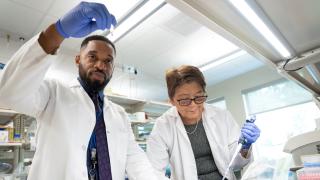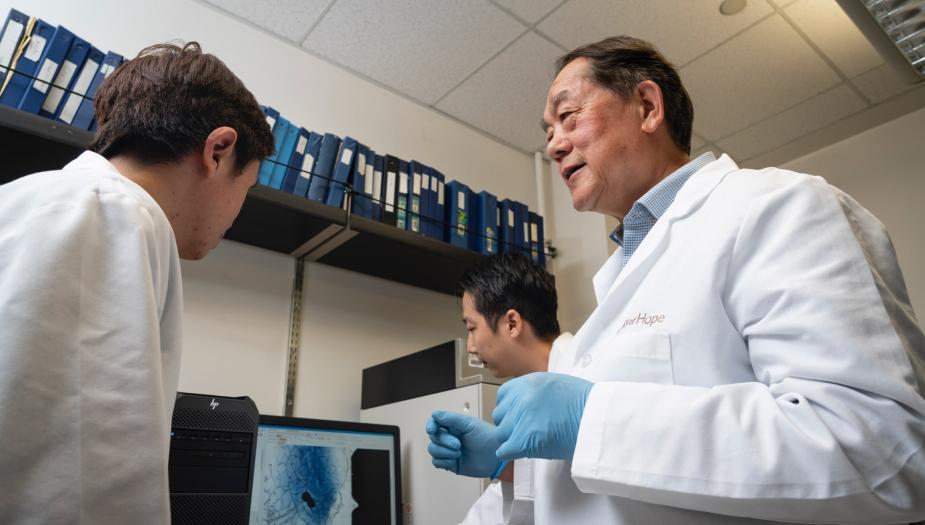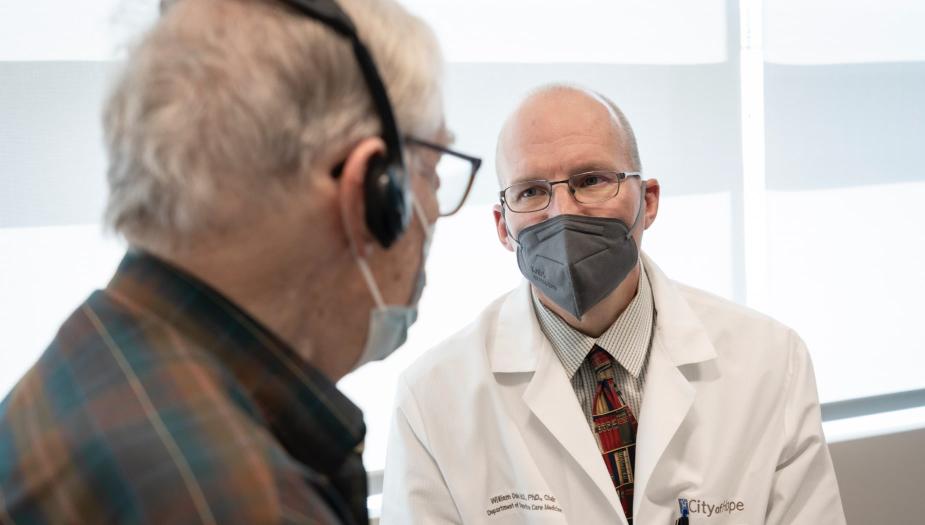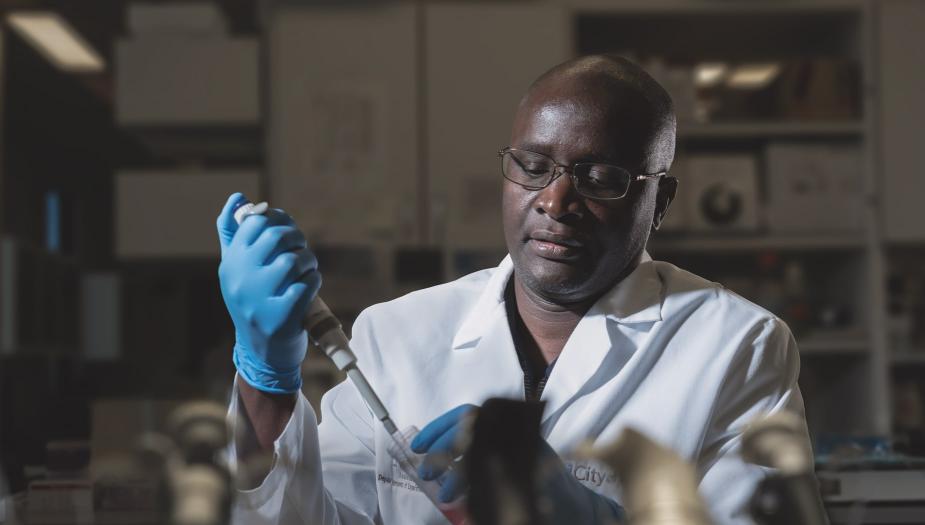
Clinical Trials
We’re aggressively pursuing ways to help our patients right now – not years from now. That immediacy of focus makes City of Hope a worldwide leader in administering clinical trials. In a given year, we conduct more than 800 clinical trials enrolling more than 5,000 patients.
Many of today’s most effective cancer and disease therapies are based on the results of clinical trials that depend on volunteer patients. By being part of a clinical trial, a patient could benefit from the latest treatments available, including treatments that are promising but currently unproven.
A clinical trial is a scientifically designed study conducted to:
- Answer specific questions about vaccines, new therapies or novel ways of using known treatments
- Determine whether new drugs or treatments are effective
- Development new procedures and treatments to improve patient outcomes and advance medical science
Each trial is a partnership involving a patient, a physician, a medical organization and frequently a government agency or private company that sponsors the research. City of Hope currently conducts many promising and innovative clinical trials through our involvement in the National Comprehensive Cancer Network (NCCN). These clinical trials help to redefine treatment outcomes and care standards for patients nationwide.
If you're interested in participating in one of our clinical trials, please contact your physician so they may refer you to a trial that holds promise for you.

If you're interested in referring a patient or a patient has requested information on clinical trials, browse the clinical trials currently recruiting.

If you're interested in the methodology and results for any of our clinical trials, please check out our Research section for a list of conditions and the studies we're conducting.

You can immediately access Clinical Trials to find out about clinical trials that are being conducted at City of Hope; but you must first be seen by a doctor to determine whether you are eligible to participate in a specific trial. Once the patient has been seen by a City of Hope physician, he or she will be provided with information about treatment and can inquire about clinical trials.
A patient participating in a clinical trial typically receives a promising new treatment that needs to be investigated in order to receive government approval. For many patients facing life-threatening diseases who have exhausted the available treatment options, clinical trials offer new hope for survival.
The range of trials available today is extremely broad. Although many trials focus on patients with more advanced disease, a significant number of studies fall into areas such as screening techniques, early disease treatment and alleviation of symptoms. All clinical trials have specific guidelines for participant eligibility. These guidelines are based on such factors as type of disease, age, medical history and current medical condition. Before entering into a clinical trial, you must meet the criteria for the study.
The benefits and risks
Participating in a clinical trial can be a way of helping yourself and others. Patients who participate in a clinical trial often feel they are taking a more active role in their care. In a clinical trial, participants have access to new drugs and treatments before they are widely available. Because controlling and recording all factors is critical to the trial's success, participants get excellent attention and are closely monitored and cared for. In addition, the data gathered from the trial can go on to benefit others.
There are risks to participating in clinical trials that must be weighed against the potential benefits. There may be some unpleasant or serious side effects from treatment. The trial may take a lot of time with repeat hospital visits, additional treatments and involved dosages. And the treatment may not end up being effective for the person participating.
Clinical trial research is designed for a variety of different clinical objectives, ranging from disease prevention to quality of life, in both adults and children.
Disease prevention: test new approaches to prevent diseases in people who have never had the disease or to prevent it from coming back in people who have already had the disease.
Disease screening and detection: test new approaches to find a disease in its earliest stage, optimizing the potential success of the treatment.
Disease treatment: test new treatments such as a new drug, new approaches to surgery or radiation therapy, new combinations of treatments or a new treatment method.
Symptom management: test new treatment approaches to reduce the side effects from primary treatments such as chemotherapy, radiation therapy or surgery.
Quality of life: explore ways to define and measure the patient's experiences during and after treatment, such as psychosocial problems, daily functioning and pain management.
All clinical trials are based upon a study plan called a protocol. Designed with great care, the plan helps to ensure the safety of the participants and answer specific research questions. A protocol details the specifics of the study: who can participate, different procedures, test schedules, medications and dosages, and the length of the study.
Clinical trials are conducted in four different phases with each phase serving a specific purpose to researchers.
Phase I: Assess the safety of a new drug. The phase is usually done with a small group of people (20 to 80) and evaluates how the body handles the drug, safe dosage ranges and side effects.
Phase II: The drug or treatment is given to a larger group (100 to 300) to determine effectiveness and to continue to evaluate safety.
Phase III: Hundreds or even thousands of people may receive a new drug or treatment and be followed for several years. This phase helps confirm the effectiveness of the drug, gauge side effects and gather information so the drug or treatment can be used safely.
Phase IV: The drug or treatment has received Food and Drug Administration approval and is widely marketed. This allows researchers to gather additional safety information on an even larger group of people and gather data on a drug or treatment's long-term effectiveness and how it affects quality of life. The drug or treatment may also be evaluated for cost and against other similar drugs already on the market.
A clinical trial is a scientifically designed study conducted to:
- Answer specific questions about vaccines, new therapies or novel ways of using known treatments.
- Determine whether new drugs or treatments are effective.
- Develop new procedures and treatments to improve patient outcomes and advance medical science.
Each trial is a partnership involving a patient, a physician, a medical organization and frequently a government agency or private company that sponsors the research. City of Hope currently conducts many promising and innovative clinical trials through our involvement in the National Comprehensive Cancer Network (NCCN). These clinical trials help to redefine treatment outcomes and care standards for patients nationwide.
Clinical trials offer an opportunity for patients to take an active role in their health care. By participating, patients have the chance to make a difference in their own lives and those of future generations.
A clinical trial may also be the best way to get the most advanced, leading-edge treatment. Participants may have access to new drugs and treatments before they are widely available, and because controlling and recording all factors is critical to the trial's success, participants get excellent attention and are closely monitored and cared for. If you are interested in taking part in a clinical trial or would like more information about City of Hope's clinical trials call 626-218-1133.
You may search through our active clinical trials online. To speak with one of our care professionals about treatment at City of Hope, contact our New Patient Services online or call us at 626-218-1133.